CUEB Hosts 2023 China ESG Forum
On December 29, under the guidance of the China Enterprise Management Science Foundation (CEMSF) and the Beijing Municipal Commission of Development and Reform, the “2023 China ESG (Environment, Social Responsibility, Corporate Governance) Forum & the First Beijing ESG Academic Symposium” was hosted in Beijing by CUEB and co-hosted by the CUEB China ESG Institute. The forum was supported by the Chinese Institution of Business Administration, PICC Group, the New Energy Vehicle Brand Cluster, First Capital Securities, and YoujiVest. More than 200 experts, scholars, and managers from government departments, social organizations, colleges and universities, well-known enterprises, and financial institutions attended the forum. They had a pleasant discussion about how to build an ESG system with Chinese characteristics under the guidance of the New Development Philosophy, further advance high-quality economic development, and accelerate modernization with Chinese Characteristics.
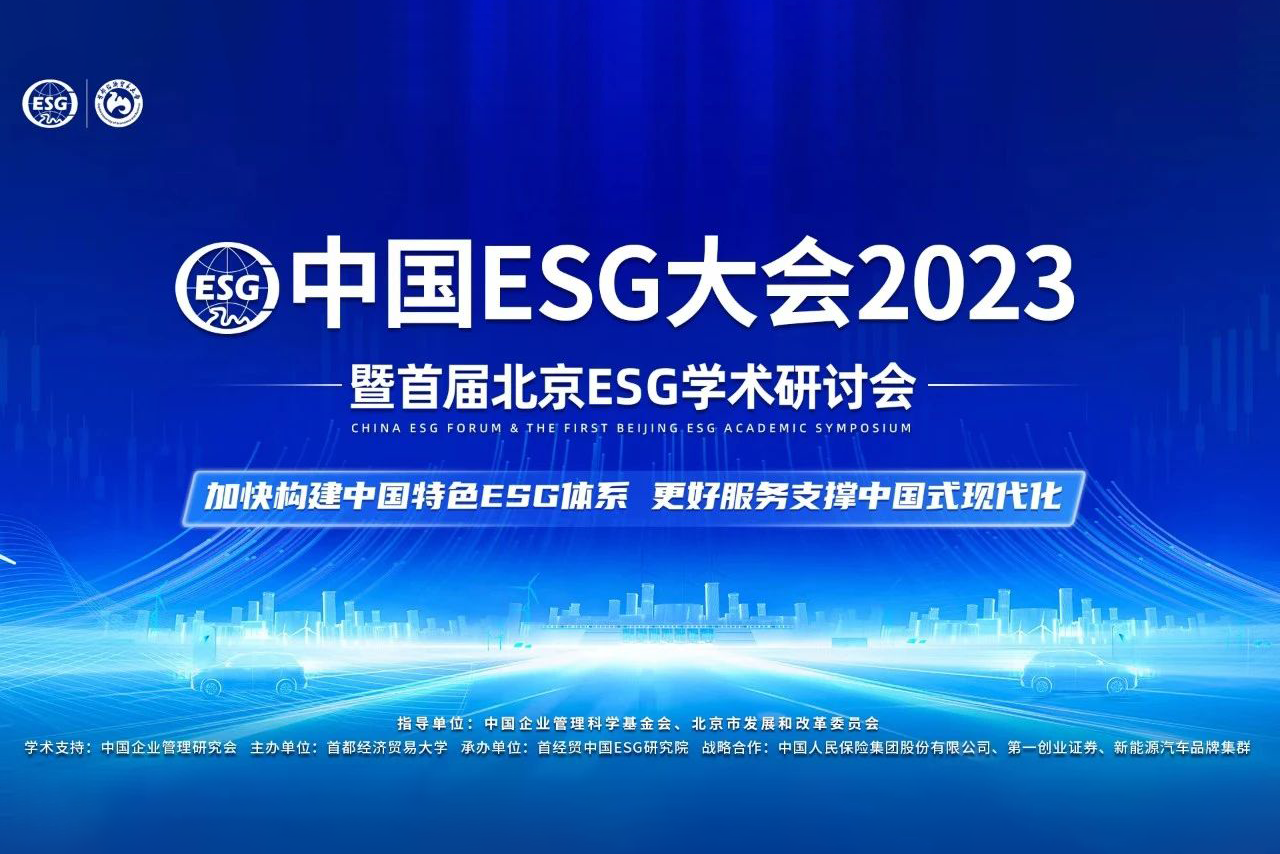
At the opening ceremony, Wu Weixing, CUEB President, and Fang Mingcheng, Level II Bureau Rank Official of Beijing Municipal Commission of Development and Reform delivered speeches on behalf of the host and the guiding departments respectively.
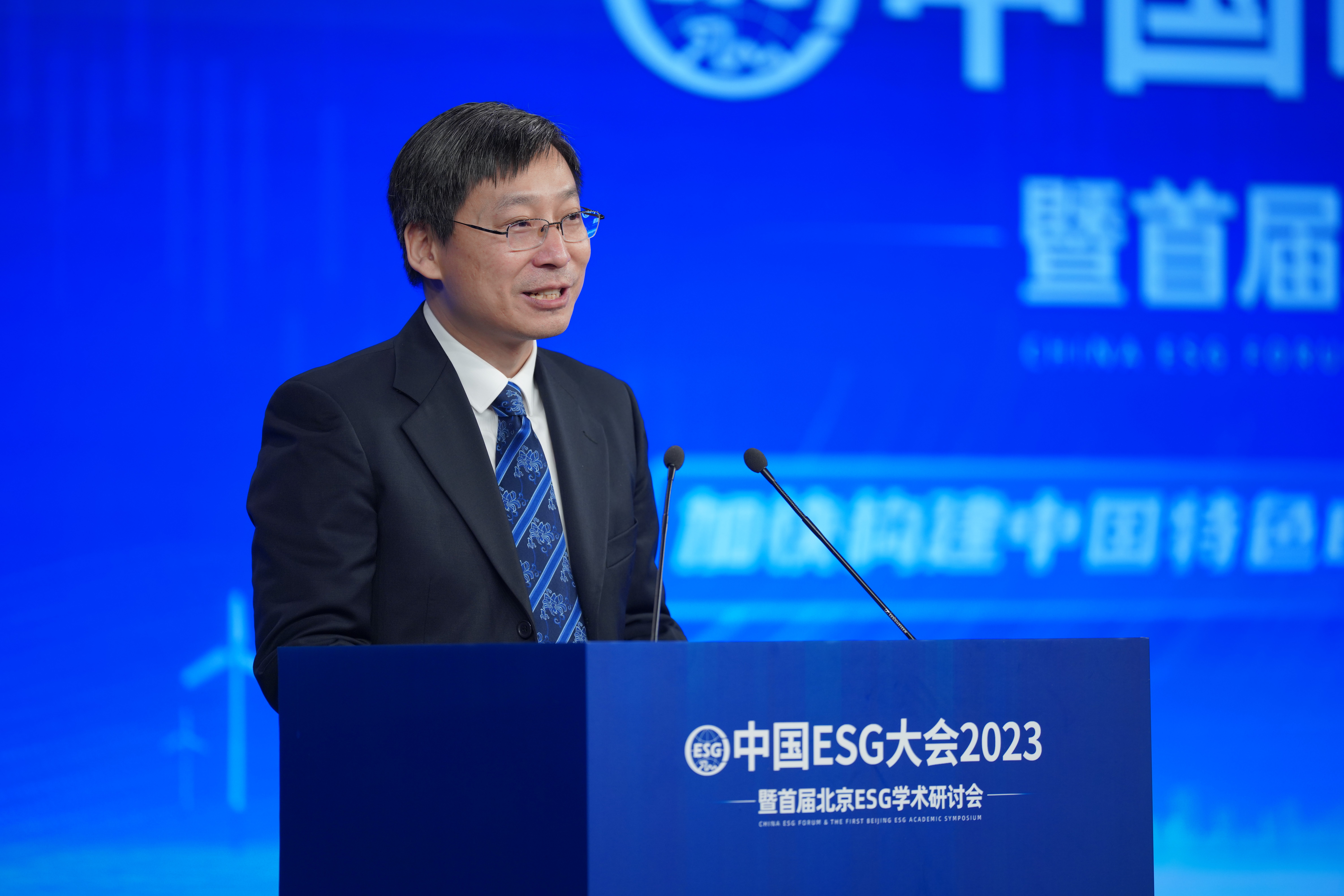
Wu Weixing delivers a speech.
Wu noted that CUEB has held the China ESG Forum for the third consecutive year since 2021. In the past three years, the CUEB China ESG Institute has made contributions to the development of ESG system and sustainable development strategies like carbon peaking and carbon neutrality. He remarked that colleges and universities are important parts of the system. As a municipal high-level financial university in Beijing, CUEB has the responsibility to contribute to the high-quality economic development of the capital. CUEB has been exploring a model for supporting the construction of the ESG system in our capital and even in China, exploring solutions for issues concerning personnel, research, and think tanks around the system. Wu hoped that all the participants would pool wisdom to the development of the ESG system, create a new chapter of high-quality development, and make contributions to a better future for modernization with Chinese characteristics.
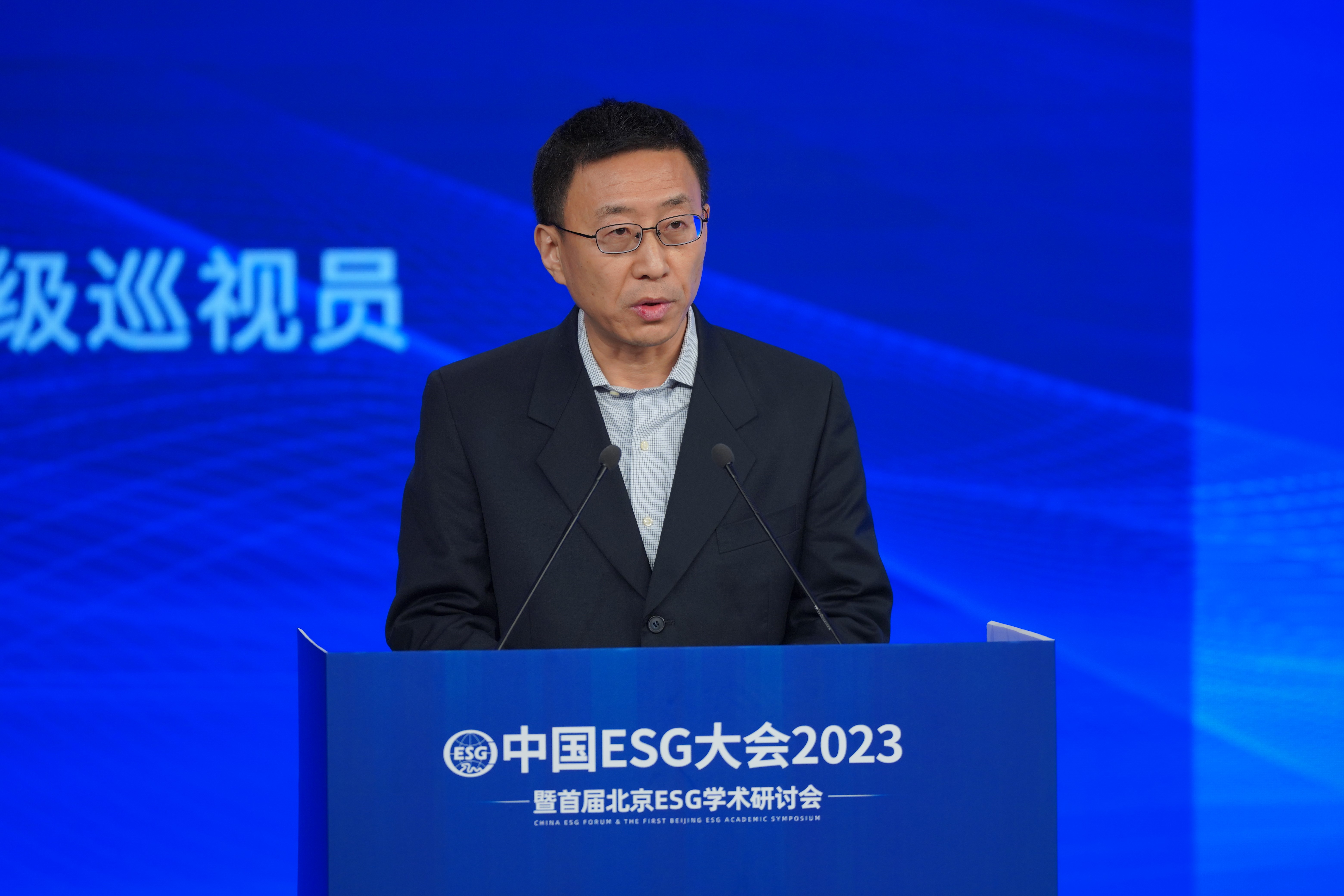
Fang Chengming delivers a speech.
In Fang’s speech, he mentioned that Beijing has already laid a good foundation for the ESG system. Central enterprises, municipal state-owned enterprises, multinational corporations, and leading enterprises in Beijing have good practices. In the future, the commission will make good use of the achievements of the forum to implement policy measures in areas such as ESG information disclosure, the development of rating and assurance agencies, the construction of an ESG system, investment and practice, and scientific and effective supervision. This will help to comprehensively improve the development of Beijing’s ESG system.
Many well-known experts and scholars delivered keynote speeches, sharing insights on the research and application of ESG.
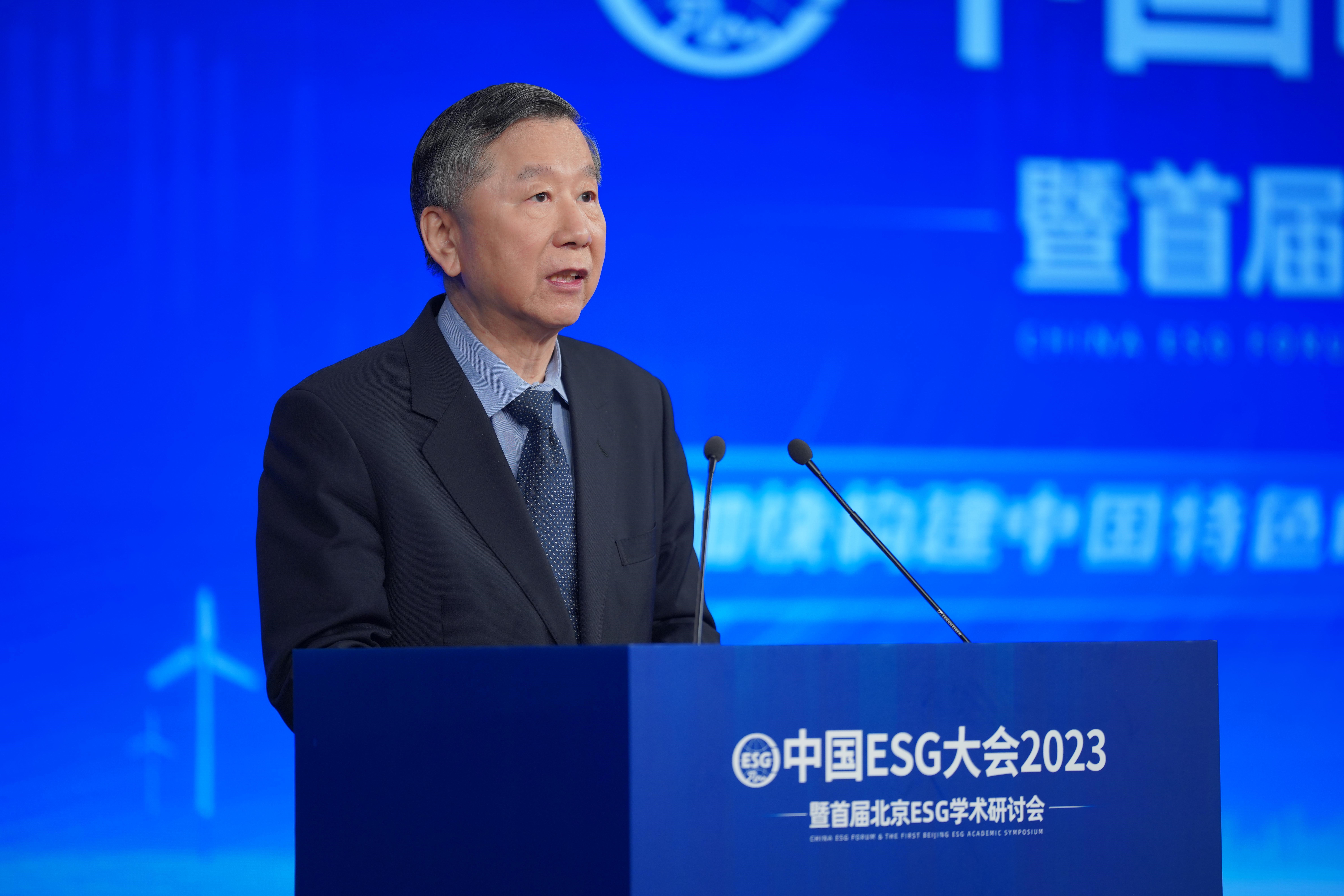
Shang Fulin delivers a speech.
Shang Fulin, a member of the Standing Committee of the 13th Chinese People’s Political Consultative Conference (CPPCC) and the 13th Chairman of Committee on Economic Affairs of the CPPCC, said that “ESG is highly compatible with the essence of modernization with Chinese Characteristics. The ESG system is also a vivid practice guided by the New Development Philosophy.” In his keynote speech, Shang remarked that enterprises should contribute to the ecological civilization construction and environment protection, shoulder responsibility for employees, supply chain partners, and communities, and uphold corporate culture and morality. These endeavors would progress in Chinese Modernization featuring common prosperity for all, material and cultural-ethical advancement, and harmony between humanity and nature. As for the relationship between ESG and the new development concept, “innovation” is the core element, “cooperation” is the essence, “green” is the practical foundation, “openness” is an important feature, and “sharing” is the goal. To build an ESG system with Chinese Characteristics under the guidance of the new development philosophy, on the one hand, we should center on people, and on the other hand, we should understand the key role of common prosperity and coordinate common wealth with ESG system construction.
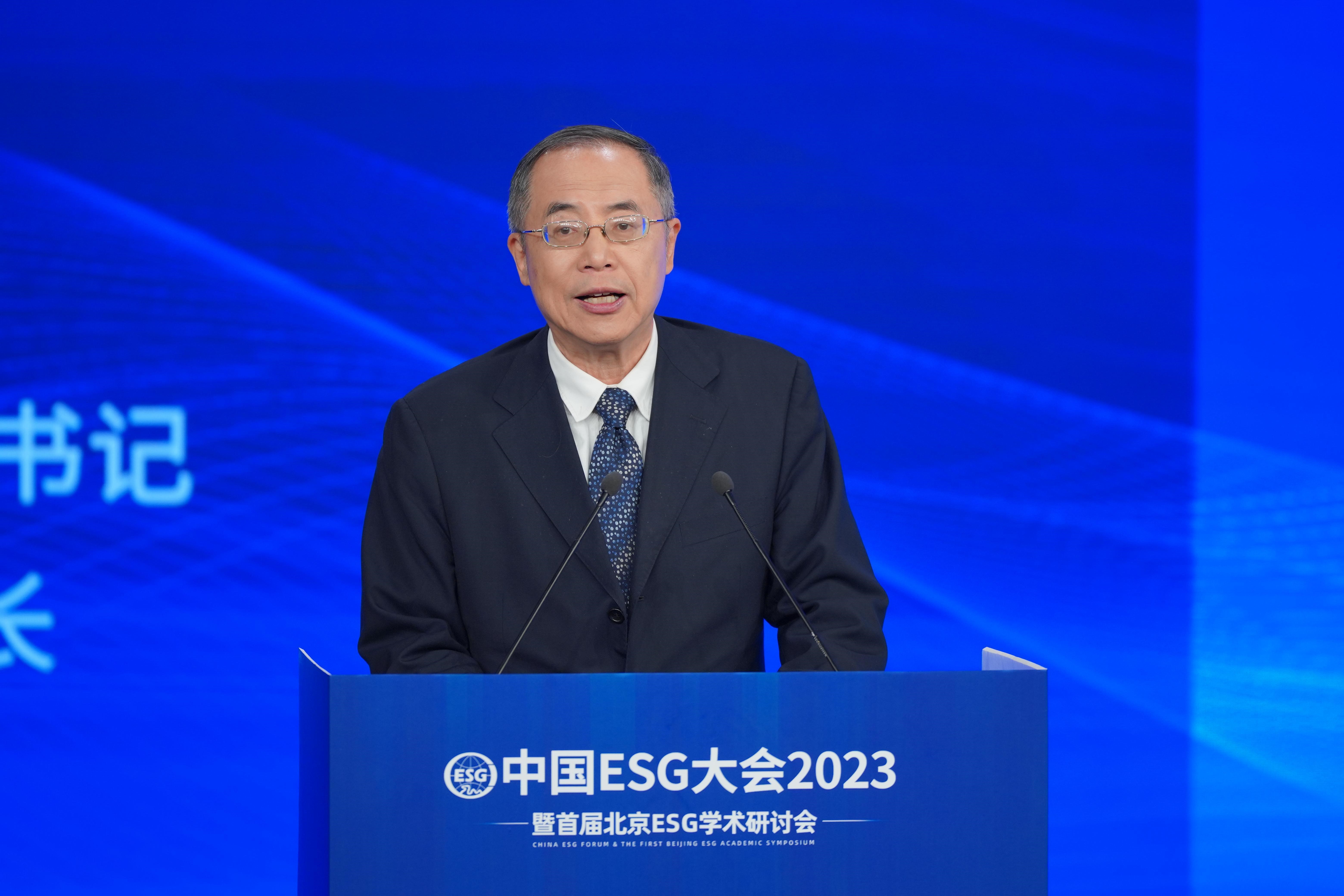
Zhu Hongren delivers a speech.
Zhu Hongren, Party Secretary, Executive Vice Chairman and Director General of the China Enterprises Confederation/China Enterprise Director Association (CEA/CEDA), focused on the enterprise in his keynote speech. He highly agreed with Shang Fulin’s views. In terms of enterprise effectiveness evaluation, ESG made a shift from using the economy as the only indicator to a diverse and comprehensive standard. In terms of corporate codes of conduct, the global ESG regulation became more mandatory and standardized. Zhu also proposed schemes for enterprises on how to promote high-quality development through high-level opening-up and in-depth reform from the perspective of ESG.
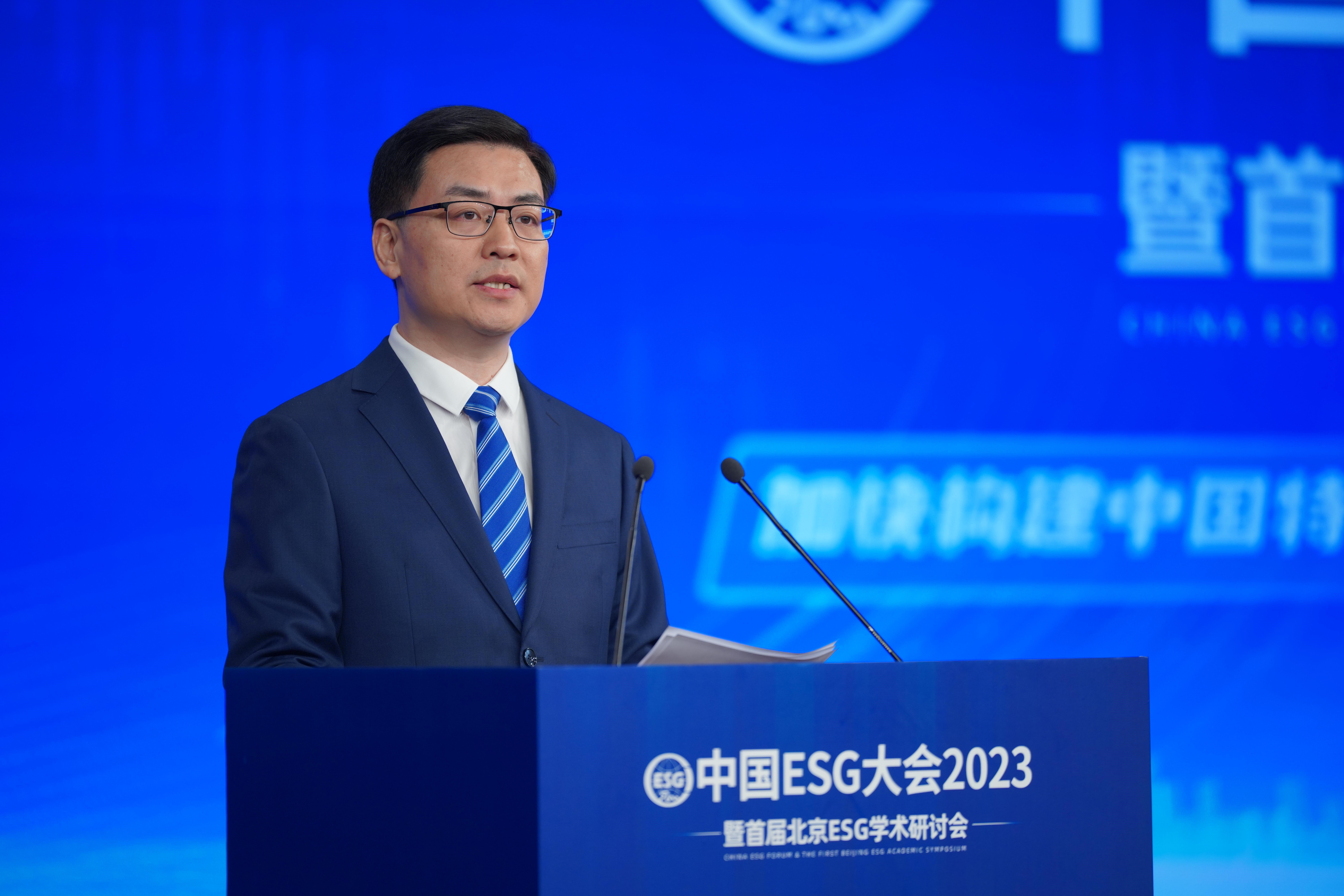
Li Yuncheng delivers a speech.
Li Yuncheng, General Manager of China Water Exchange, mentioned in his keynote speech that as Chinese Modernization and high-quality development advance, improving the intensive and economical use of water resources will become a must for enterprises, which is both an opportunity and a challenge. The development of water rights exchange has a positive effect on maintaining the cleanliness of the water body, promoting sustainable socioeconomic development, and enhancing the well-being of the people. China Water Exchange will progress Chinese Modernization with the high-quality water rights exchange.
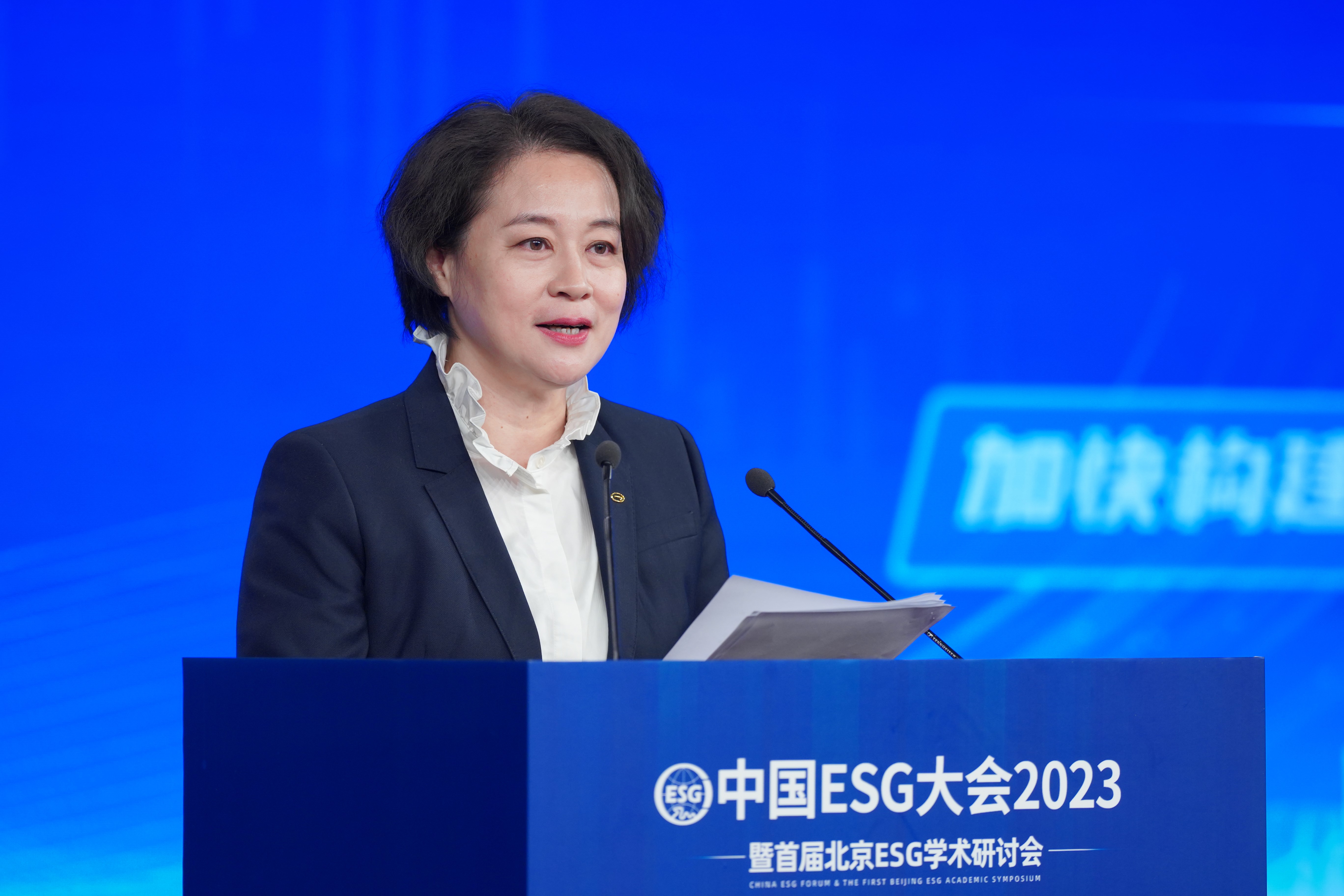
Yin Jie delivers a speech.
Yin Jie, General Manager Assistant and Director of Brand PR Department of GAC Group, mentioned in his keynote speech that the new technological revolution had reshaped the automotive industry, and automobiles are transforming from traditional transportation tools to mobile intelligent terminals, energy storage units and digital spaces. The release of the carbon peaking and carbon neutrality goals has accelerated the electrification of automobiles and the green energy system. GAC Group integrated the ESG into its development strategy to aid in the achievement of green and low-carbon transformation goals.
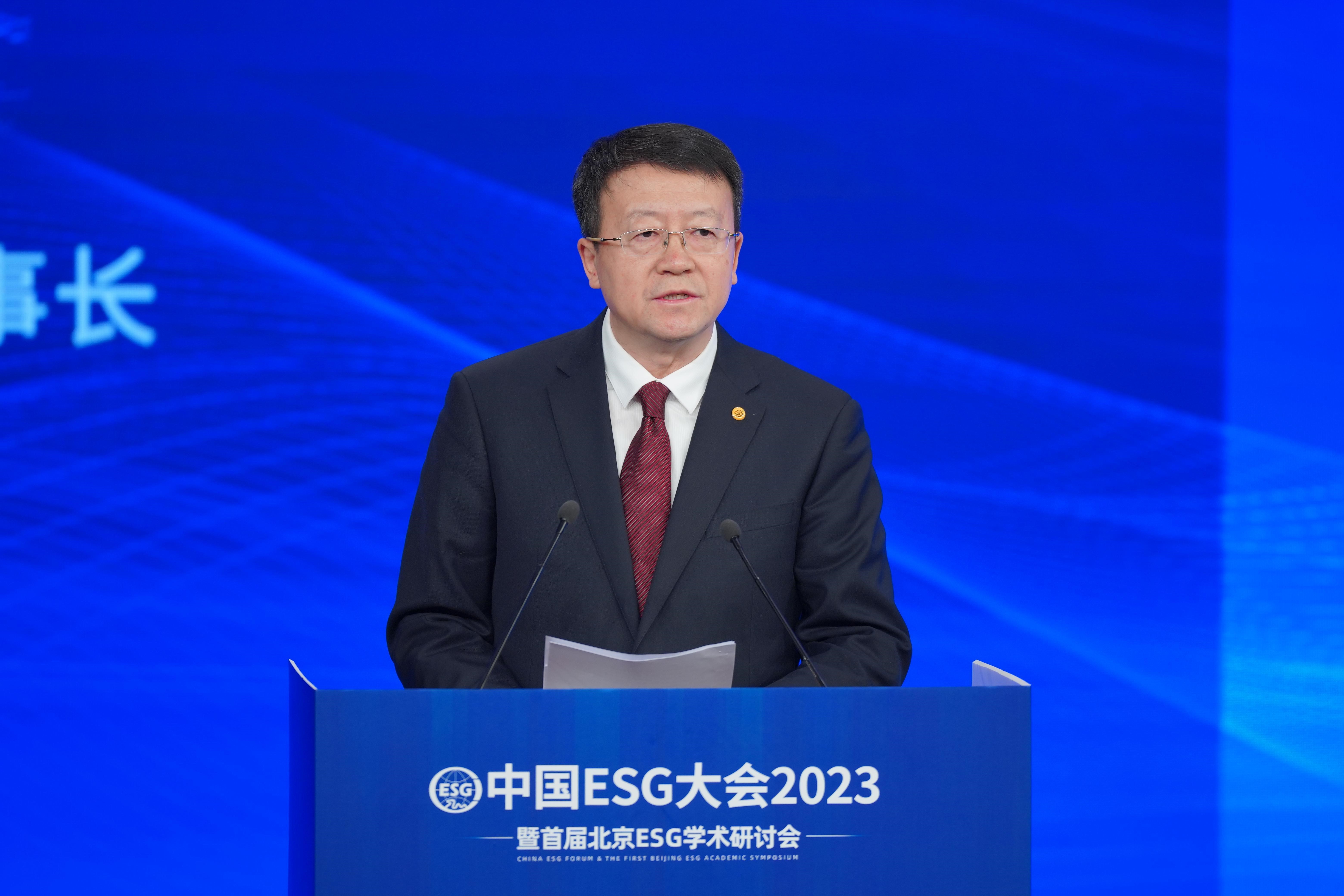
Wang Naixiang delivers a speech.
Wang Naixiang, chairman of the China Beijing Green Exchange (CBGEX), stated in his keynote speech that the CBGEX is developing the construction of the greenhouse gas emission reductions trading market, the public management platform for carbon peaking and carbon neutrality, the infrastructure for green finance, the global green and sustainable financial center. Wang stated that the CBGEX progressed work from four aspects: participation in the construction of standard ESG systems, development of ESG management systems and tools, ESG capacity building, and improvement of the ESG service system. CBGEX will continue to improve its three core capabilities of carbon pricing, carbon emissions, and carbon finance, and build an ESG public service platform for information.
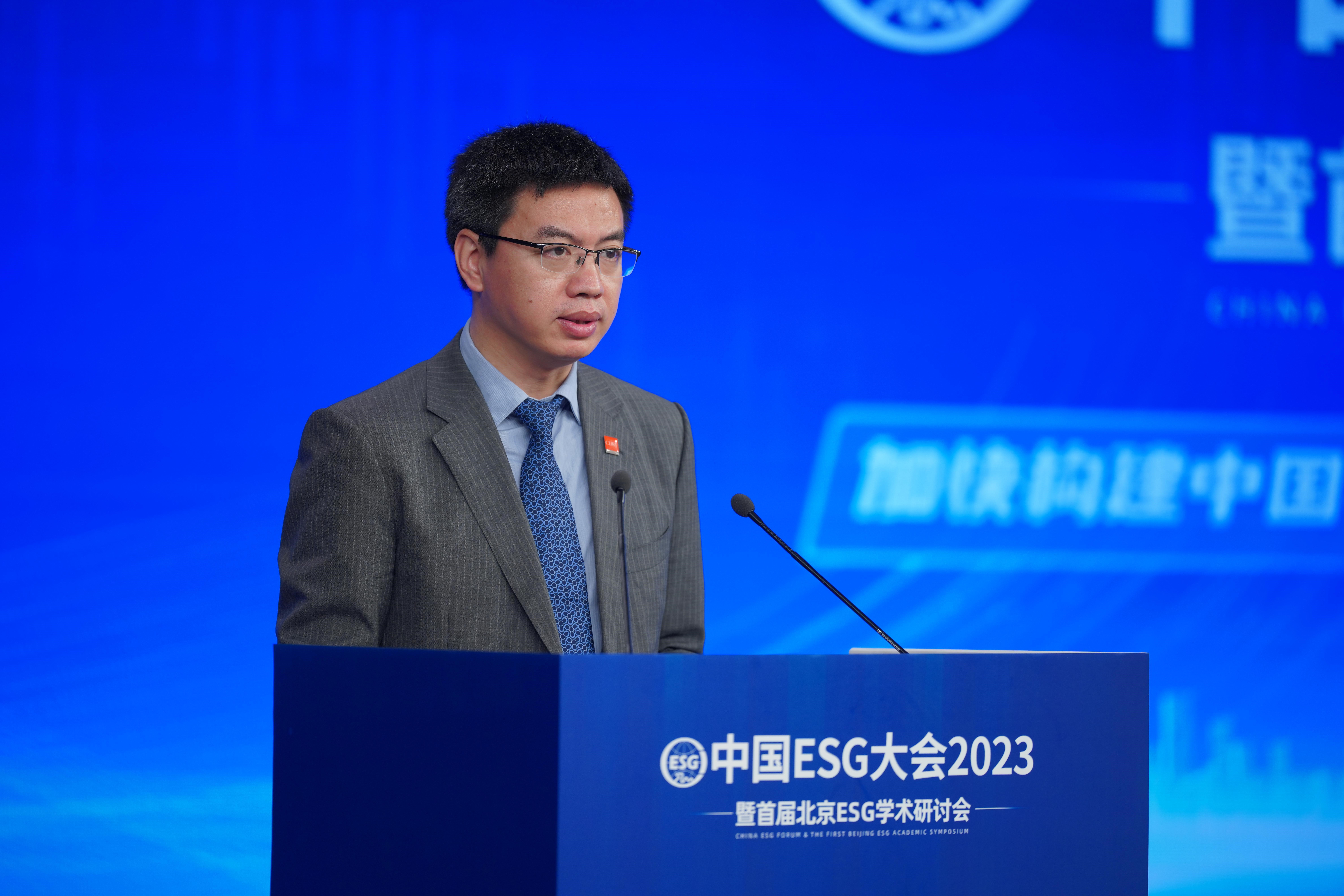
Yu Jiantuo delivers a speech.
Yu Jiantuo, Deputy Secretary General of China Development Research Foundation, mentioned in his keynote speech that ESG could help high-quality development from two aspects. One is to directly improve the quality of economic development by influencing enterprises, and the other is to develop the modernization of the economic governance system and capabilities. There is still a long way to improvement in ESG practices in China. To this end, it is necessary to build an integrated and unified ESG policy framework, take ESG information disclosure as a leverage to improve its standardization, improve the ESG service system, increase public education, and make long-term arrangements realistically in advancing ESG practices, and ultimately assist with high-quality development.
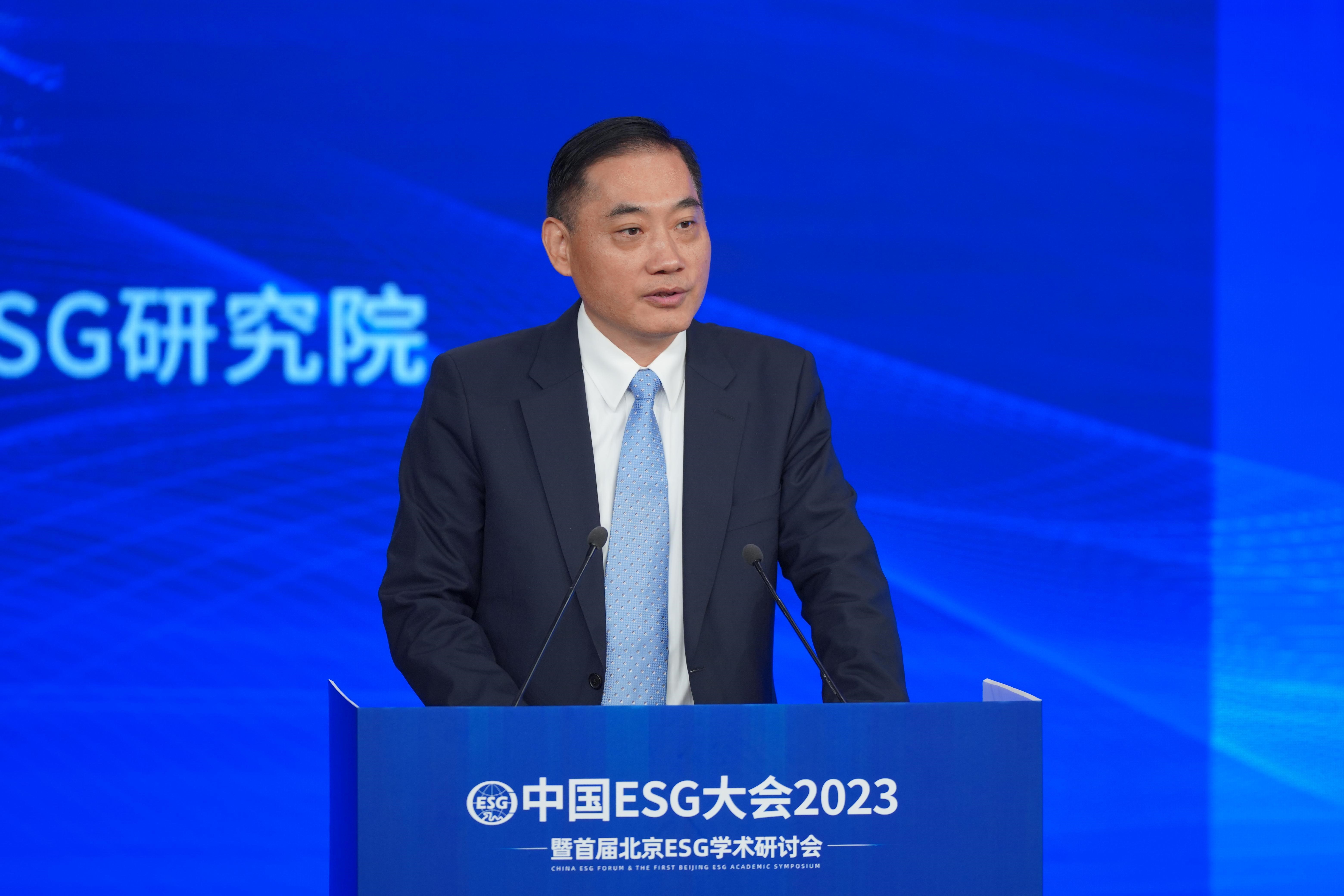
Qian Longhai delivers a speech.
Qian Longhai, president of CUEB China ESG Research Institute and the chairman of Truvalue Asset Management Co., Ltd., mentioned in his keynote speech that ESG was a breakthrough in the enterprise development theoryand an upgrade of enterprise civilization, that it was an important tool to promote the implementation of the New Development Philosophy, accelerating the green and low-carbon transformation, that it was an ecosystem that encouraged enterprises to practice the concept of sustainable development with market-oriented methods, and that its disclosure standards were the most important infrastructure, so it was both urgent and feasible to speed up the construction of China’s ESG disclosure standards.
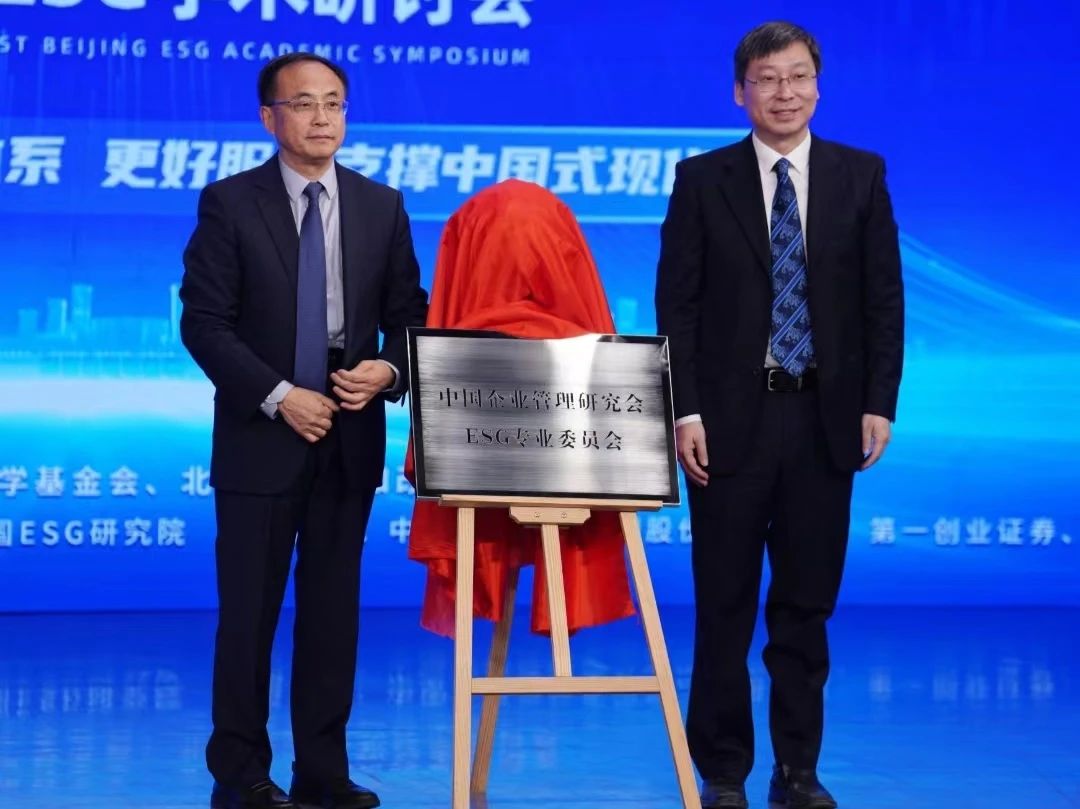
Wang Wenju and Wu Weixing unveil the Professional Committee.
After the keynote speech, Liu Xuexin, Dean of the College of Business Administration and Executive Director of China ESG Institute, presided over the unveiling ceremony and research outcome publication. ESG is an important lever for the comprehensive green transformation of China’s economic and social development. However, there is still a long way to go in ESG theory research, standard construction, and practice promotion. Therefore, the Chinese Institute of Business Administration (CNIBA) has decided to establish a specialized ESG committee. Directly under the CNIBA, the ESG Committee of CNIBA is a professional committee featuring national, professional, public welfare, and non-profit in the field of enterprise management in China. Professor Wang Wenju, Secretary of the Party Committee of CUEB, and Professor Wu Weixing, President of CUEB, unveiled the establishment of the ESG Committee of CNIBA.
During the research outcome publication session, the China ESG Research Institute of CUEB released research reports, including China ESG Development Report 2023, Evaluation Report on the Sustainable Development Capacity of Chinese Cities 2023, and Enterprise ESG “1+N+X” Standard System, sharing its latest research findings. Over the past three years, under the guidance of consultant Shang Fulin, the China ESG Research Institute of CUEB has continuously tracked and researched the forefront and key issues of ESG and conducted scientific research on key theoretical issues related to ESG, bringing forth achievements in scientific research, standard development, personnel cultivation, and social services.
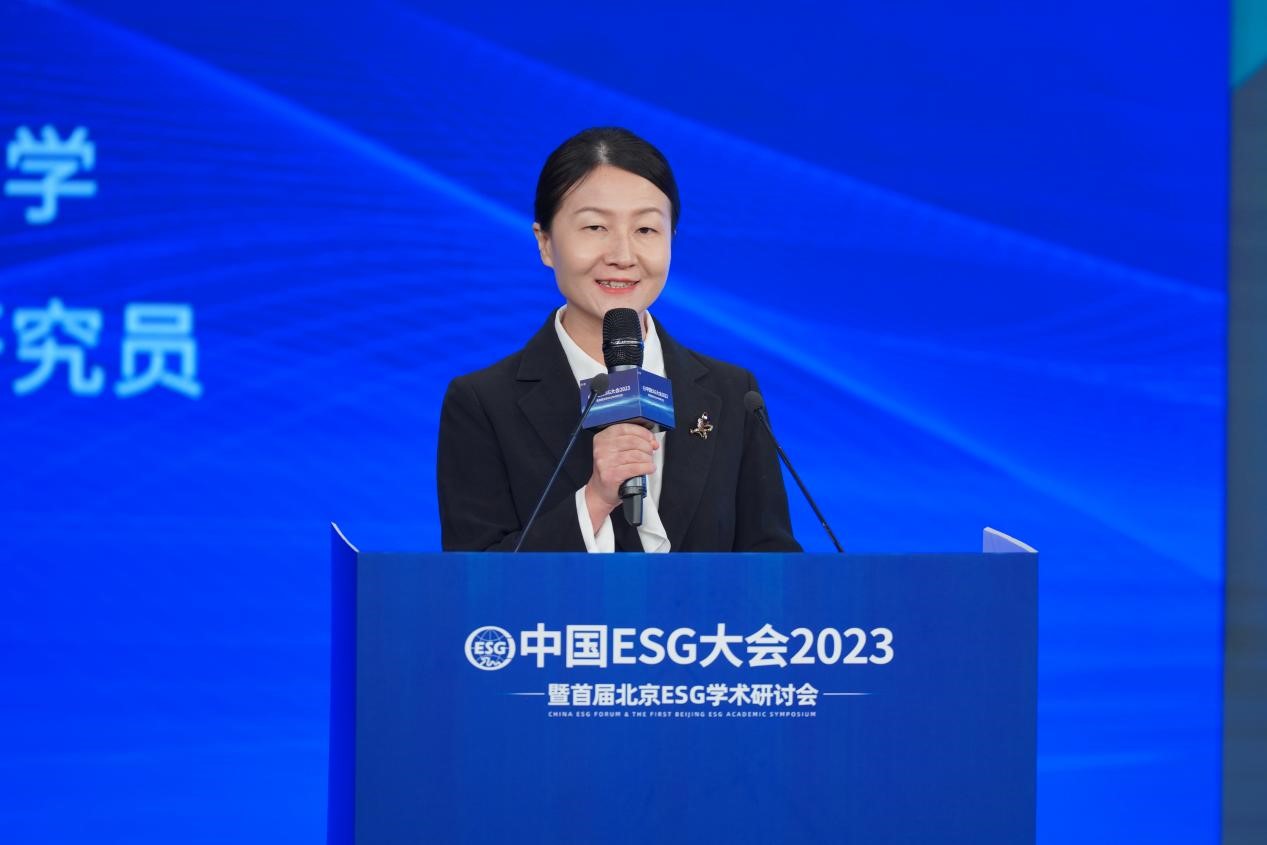
Lu Wenting delivers a speech.
On behalf of the institute, Associate Professor Lu Wenting, researcher of the China ESG Research Institute of CUEB presented the research findings of the China ESG Development Report 2023. The report aims to give a comprehensive and accurate depiction of the current situation and trends of ESG development in China, as well as to provide reference guidance and methodological tools for enterprises to practice the ESG concept. The report summarizes the situation of ESG development in China in 2023 in seven parts, including the international background of ESG development, an overview of ESG practices in China, ESG information disclosure by Chinese enterprises, ESG financial market and investment in China, ESG practices of typical case enterprises, as well as the challenges and opportunities in the current development of ESG in China. In general, ESG in China is showing a positive and strong development trend in 2023, indicating the enormous potential and bright prospects for it.

Wang Kai delivers a speech.
On behalf of the institute, Associate Professor Wang Kai, Dean of the Evaluation Center of the China ESG Research Institute of CUEB, presented the Evaluation Report on the Sustainable Development Capacity of Chinese Cities 2023. This report evaluates the sustainable development capacity of cities based on the ESG concept, emphasizing the importance of ESG evaluation in promoting high-quality development of cities and implementing the carbon peak and carbon neutrality strategies. Based on the process of urbanization in China, the report has constructed an evaluation system covering three dimensions: environment, society, and governance, including 45 tertiary indicators, 9 secondary indicators, and 3 primary indicators. The evaluation covers 297 cities, providing detailed insights into the development trends of municipalities, provincial capitals, and separately planned cities, analyzing the levels, characteristics, and capacity of sustainable development capacity in different cities, and identifying the existing problems in the sustainable development capacity of cities. The report puts forward recommendations for enhancing urban sustainable development capacity, including promoting comprehensive governance, source governance, collaborative governance, and efficiency governance.
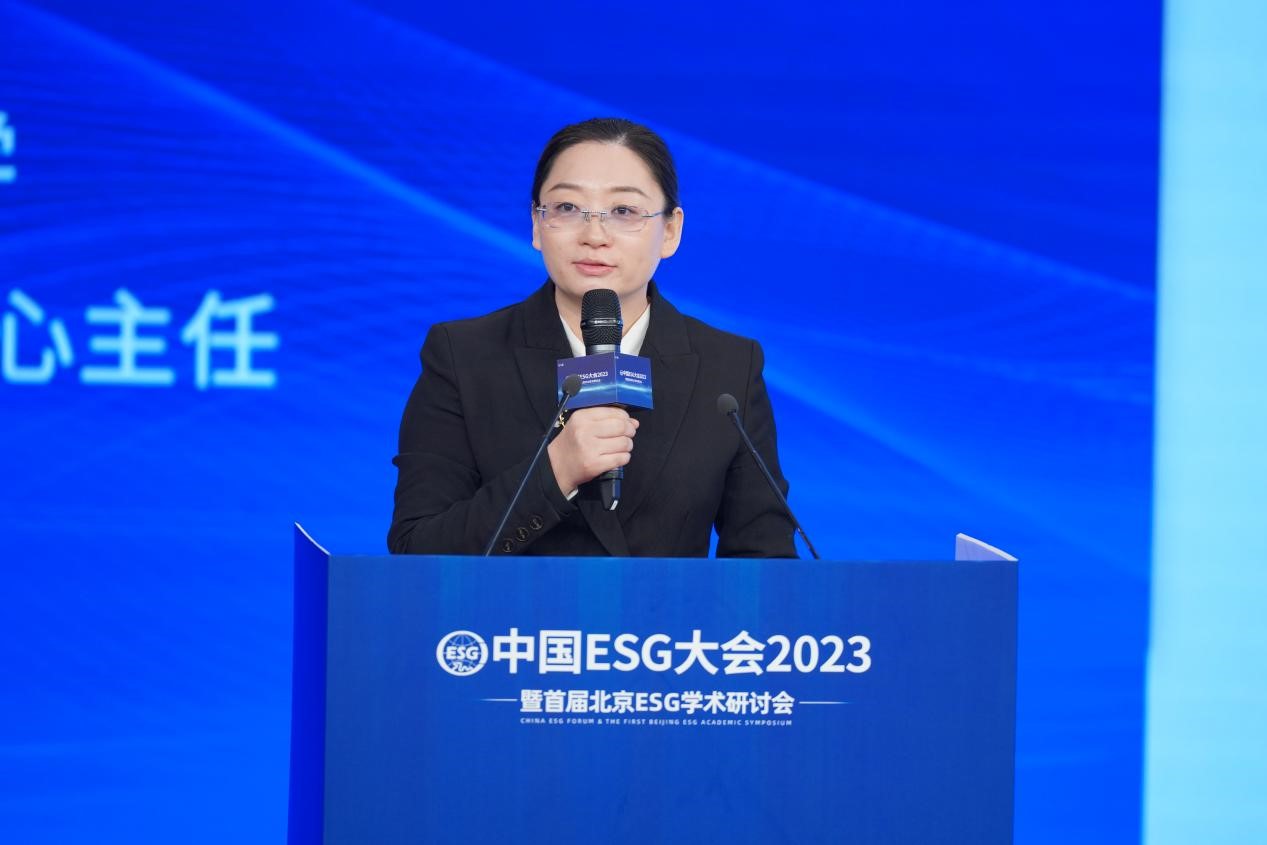
Sun Zhongjuan delivers a speech.
Professor Sun Zhongjuan, Director of the Disclosure Standard Center of the China ESG Research Institute of CUEB, presented the Enterprise ESG “1+N+X” Standard System on behalf of the institute. Since July 2020, based on the importance of ESG standards as well as domestic and international practices, the China ESG Research Institute has proposed the enterprise ESG “1+N+X” standard system, aiming to lead the enhancement of corporate value by exploring new logic of corporate value and core value models. In this system, “1” refers to general standards, “N” refers to industry standards, and “X” refers to specific standards. The general standards involve developing disclosure standards based on common consensus core commonality issues from the environment, society, and governance. The industry standards are based on the substantial issues related to “consumption-management-optimization” upstream and downstream throughout the industry. The specific standards are based on the leading substantial issues of the New Development Philosophy. Up to now, the China ESG Research Institute has developed more than 10 standards and continues to develop more. In the future, the China ESG Research Institute will continue to work with various sectors, focusing on the development of ESG standards in China, and contribute to the benign and high-quality development of the ESG ecosystem in China.
In the afternoon, the conference held four round table forums on “ESG and New Energy Vehicles,” “Corporate ESG Practices,” “ESG Investments,” and “ESG Practices in the Tourism Industry.” Over 20 entrepreneurs and researchers from various organizations shared their experience in practicing ESG in their respective industries, as well as the opportunities and challenges.
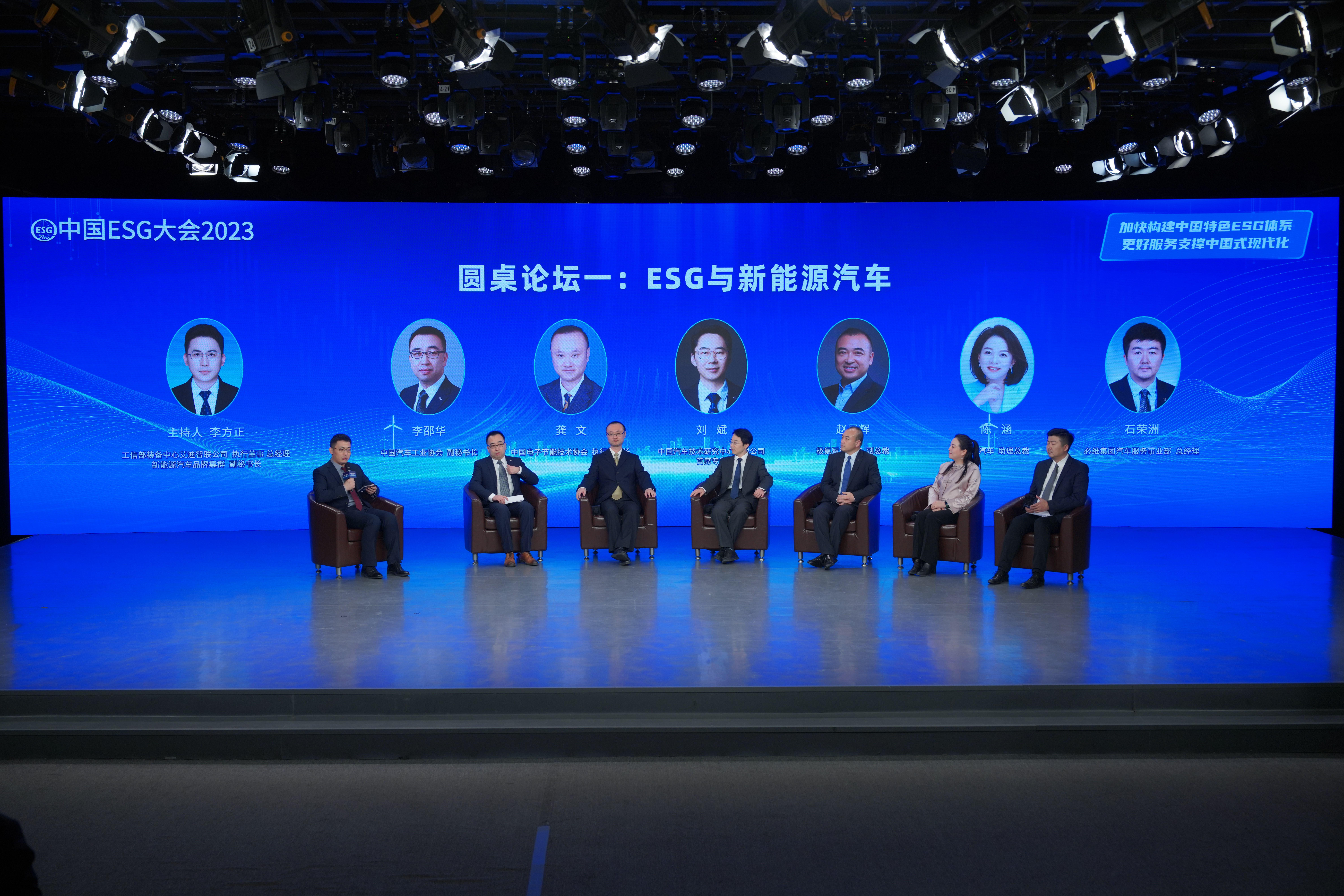
Round Table Forum One: ESG and New Energy Vehicles.
Round Table Forum One was chaired by Dr. Li Fangzheng, General Manager of EIDC Intelligent Connected Technology C., Ltd affiliated with the Ministry of Industry and Information Technology Equipment Industry Development Center, and Deputy Secretary-General of the New Energy Vehicle Brand Cluster. The discussion was attended by Li Shaohua, Deputy Secretary-General of the China Association of Automobile Manufacturers, Gong Wen, Executive Secretary-General of the China Electronics Energy Saving Technology Association, Liu Bin, Chief Expert of the China Automotive Technology and Research Center Co,. Ltd., Chen Han, Assistant President of Xiaopeng Motors, Zhao Yuhui, Vice President of ZEEKR, and Shi Rongzhou, General Manager of the Automotive Service Division of Bureau Veritas. The integration of ESG and new energy vehicles is a development trend in the future automotive industry. Therefore, the government, industry associations, and companies should strengthen cooperation and communication to jointly promote this trend, so as to contribute to the establishment of a better ecological environment and society.
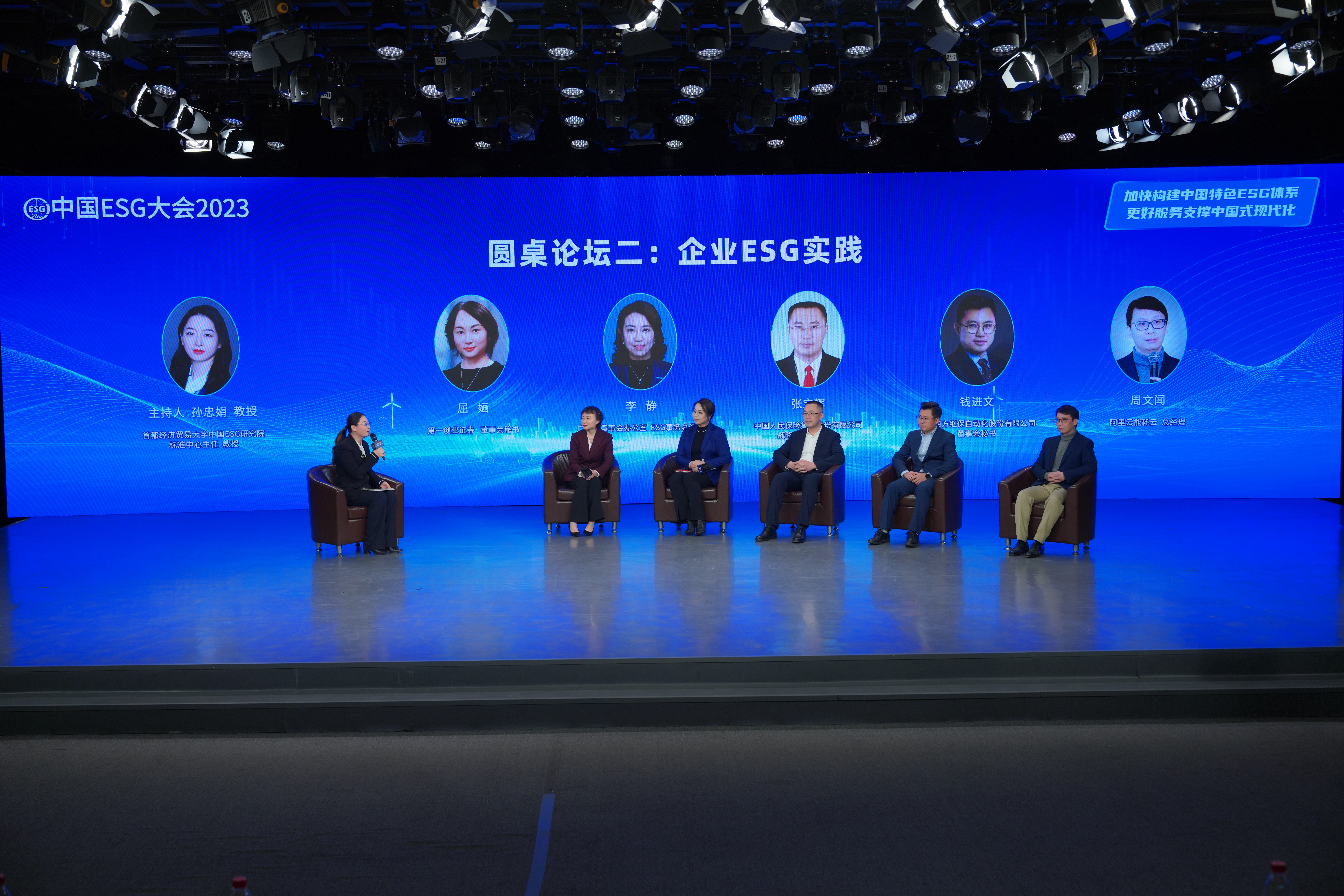
Round Table Forum Two: Corporate ESG Practices.
Round Table Forum Two was chaired by Professor Sun Zhongjuan, Director of the Disclosure Standards Center of the China ESG Research Institute of CUEB. The discussion was attended by Qu Hua, Secretary of the Board of Directors of First Capital, Li Jing, ESG Affairs General Manager of the Board Office of Glodon, Zhang Baohui, head of the Strategy Department of PICC, Qian Jinwen, Secretary of the Board of Directors of Beijing Sifang Automation Co., Ltd., and Zhou Wenwen, General Manager of Alipay Energy Cloud. Corporate ESG practices are an important approach to promoting sustainable development for companies. The enterprises should focus on cross-departmental collaboration from a strategic perspective, strengthen information disclosure and communication based on industry characteristics and their actual situation, and emphasize personnel cultivation and team building to comprehensively implement ESG practices.

Round Table Forum Three: ESG Investments.
Round Table Forum Three was hosted by Associate Professor Wang Kai, Director of the ESG Evaluation Center of the China ESG Research Institute of CUEB. The discussion was attended by Wang Bo, ESG Researcher at YinHua Fund Management Co., Ltd., Li Shenshi, CEO of Capitallink, Zhao Binyu, Sustainable Investment Analyst at Fidelity International Greater China Region, Wang Guofeng, Chief Risk Officer at First Capital, Zhang Ruohai, Chief Analyst of ESG and Data Technology at CITIC Securities Research Department, and Hu Ruohan, General Manager and Co-founder at YoujiVest.
ESG investment is an important way to promote sustainable development and achieve long-term returns. Investors should focus on professional research and analysis, establish a comprehensive evaluation system and standards, strengthen communication and cooperation with stakeholders, and emphasize talent development and team building, so as to comprehensively advance the development of ESG investment.
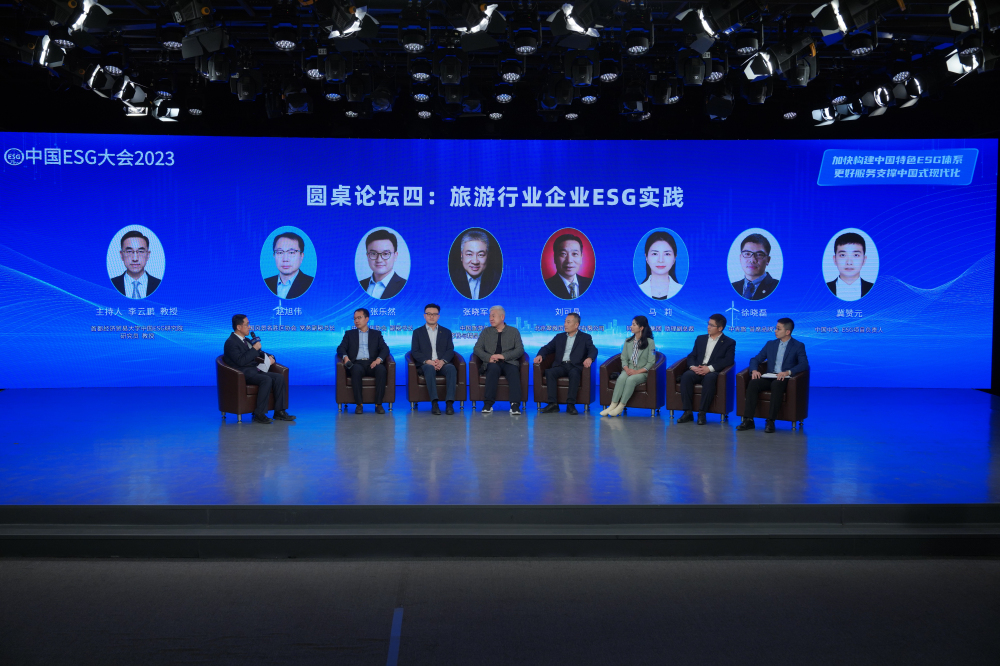
Round Table Forum Four: ESG Practices in the Tourism Industry.
Round Table Forum Four was hosted by Professor Li Yunpeng from the ESG Research Institute of CUEB. The discussion was attended by Zhao Xuwei, Executive Deputy Secretary-General of China Association of National Parks and Scenic Cities, Zhang Leran, Deputy Secretary-General of China Hospitality Association, Zhang Xiaojun, President of the China Tourism Homestay and Boutique Hotel Association, Ma Li, Assistant Vice President of Tongcheng Travel, Xu Xiaolei, Chief Brand Officer of CYTS International, and Ji Zanyuan, ESG Project Leader at China Duty Free Group Investor Relations Department. ESG practices in the tourism industry are important to promote sustainable tourism development. The enterprises should focus on environmental protection, social responsibility, corporate governance, and information disclosure, in order to comprehensively advance ESG practices.
The conference was also attended by a number of distinguished guests, including Miao Rong, Chairman of the China Enterprise Management Science Foundation, Liu Lin, Deputy District Mayor of Pinggu District, Duan Zhenwen, Deputy Director of the Development and Reform Commission, Wang Haifeng, Deputy Director of the Bureau of Ecology and Environment, Yan Peng, Deputy Director of the Development and Reform Commission of Fengtai District, Yan Xu, Director of the Free Trade Bureau of China-Singapore Tianjin Eco-City Administrative Committee, Zhao Fujun, Deputy General Manager of Liaoning Financial Holding Group, Zhou Ning, General Manager of Infotech Ventures Co,. Ltd. and Director of the China ESG Research Institute of CUEB, Zheng Peng, Assistant to the Chairman of Guoren PCIC, Lu Jinjing, Founder of the Southeast Asia and South Asia Cross-Border Talent Service Platform, Zhang Tong, Director of CUEB Party and Government Office, Zhao Xiling, Vice Chairman of the China ESG Research Institute; Li Juanting, Deputy Minister of the Party Committee Publicity Department, Huang Dongping, Dean Assistant of the China ESG Research Institute and Deputy General Manager of Yunnan International Trust Co., Ltd. Risk Management Department, Xin Bin, Vice President of SGS, as well as 197 expert representatives from 113 enterprises and institutions.
